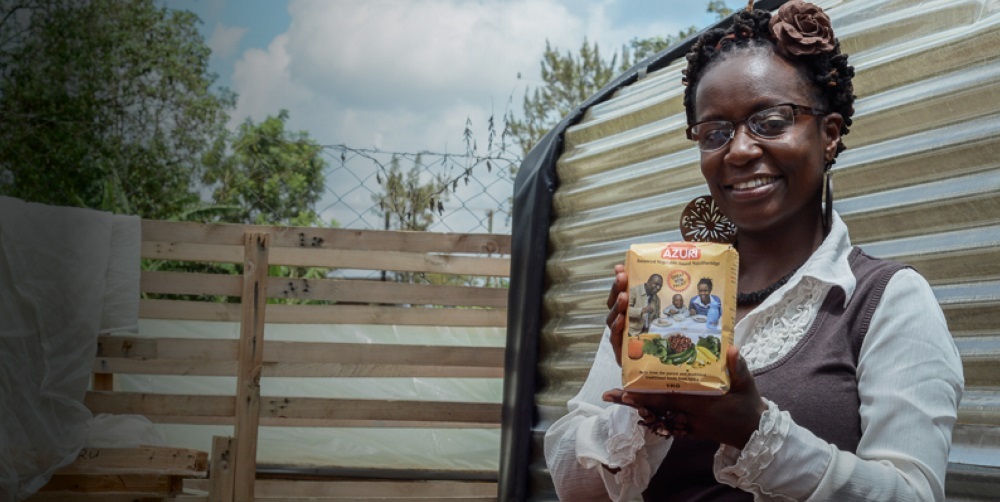When Tei Mukunya, Director of Azuri Health, prepared meals for her 112 year old grandmother, she had a realization.
“It wasn’t easy to find a good range of nutritious, easily digestible foods that she liked. Most flour was made from maize, and having a range of egetables and nutritious crops in flour wasn’t a possibility.
– Tei Mukunya, Director of Azuri Health
So she and her family, working with women’s groups, started making a nutri-porridge flour that contained other nutritious crops like beans and amaranth.
“My grandmother really noticed the difference, and felt much better. It showed me that nutritious food can have such a big impact on people’s lives.
With experience in marketing, she decided to shift her focus to producing and distributing nutritious flour and dried fruits for urban consumers.
“People are busy, and convenient foods are not always nutritious. Our products are aimed at those who want an affordable, healthy product, that doesn’t take much time to prepare.
Since she started her company Azuri Health in 2010, production of dried fruits, sweet potato flour, and bean porridge, has jumped from 300 kilograms to 4 tons a year today. Her products are available across Kenya – 90 percent of her market is major retail outlets, but she also supplies to smaller urban shops.
She has her sights set on exporting as well. She’s already received calls from interested buyers, and is in the process of setting up
the rigorous standards required to enter the European market.
She’s testing the first of eight solar-powered “bubble” driers to be installed in Kenya and Uganda, as part of a project supported by Germany’s Federal Ministry of Economic Cooperation and Development, to fight malnutrition among 50,000 rural and urban consumers.
During harvest time, all too often rain can damage crops as they dry. The driers retain bean quality and commercial value, while retaining all the nutritious qualities before they are turned into a porridge flour.
The project partnership includes the Kenya Agriculture and Livestock Research Organization, supplying farmers with improved, nutritious and higher yielding bean varieties, which Azuri Health will then buy.
Farmers are excited by this prospect. Joseph Kamoing, a member of the SATEWA group – an acronym merging the names of three villages – of 500 farmers growing the improved beans, says he can earn almost double the price he is currently earning with local varieties through the new partnership.
“With these improved beans, ‘Chelalang’, we can get 7-8 bagsfor beans, compared with 2-3 bags using local bean varieties,
Usually we sell one bag for US$34but Azuri Ltd. have promised US$58. The extra income will help buy fertilizer for next season and pay school fees.
As part of the project, scientists will also study malnutrition levels, where families source food, and how much they pay for it. This will generate a deeper understanding of which nutrients are a priority for adding to the porridge and how to best price the product for target consumers.
This work is part of the project “Making Value Chains Work for Food and Nutrition Security of Vulnerable Populations in East Africa” supported by Federal Ministry of Economic Cooperation and Development (BMZ), the German Society for International Cooperation (GIZ), and the CGIAR Research Program on Agriculture for Nutrition and Health (A4NH).
The project is led by the International Center for Tropical Agriculture (CIAT), in collaboration with the University of Hohenheim (UHOH), University of Göttingen (UGOE), Kenya Agriculture and Livestock Research Organization (KALRO) and Ugandan National Agricultural Research Organization (NARO).
What’s next
- Further research is needed to investigate consumer behavior, to improve diet choices.
- Farmers can benefit from bulking their produce to sell to companies like Azuri Health, but often they are skeptical. Good examples of success like this are needed to deepen trust, and can be used in other areas to improve incomes and nutrition for consumers.

